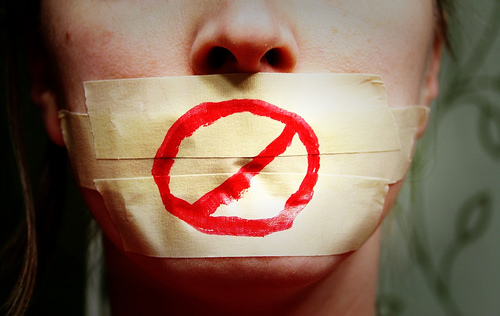There’s been heated debate as to whether the Constitution should protect what people call “hate speech”. The Supreme Court currently holds that the right to free speech is not to be limited in any way. The argument is that once the government begins banning certain forms of speech, it could find any justification to curtail this basic American freedom. The end of free speech is the beginning of a tyrannical government, one that can use “hate speech” as a scapegoat to exert control over its citizens. It is also important to note that, for many, it is difficult to determine what exactly constitutes “hate speech”.
It is definitely the case that free speech benefits racists and bigots. Take the example of a woman who went on a racist rant on a bus in NY. It seems that whenever these individuals spew hateful rhetoric towards minorities, they use free speech as a justification for their behavior.
 But minorities are consistently silenced, despite their free speech rights. Imagine if I were on a bus and said “Alhamdulillah” or “In shaa Allah” out loud because I was really happy about something. I wouldn’t, because someone would get suspicious. When I look at “See Something, Say Something” signs, I’m pretty torn between wanting to help law enforcement and being mistaken for someone guilty of a major crime just because of the way I look.
But minorities are consistently silenced, despite their free speech rights. Imagine if I were on a bus and said “Alhamdulillah” or “In shaa Allah” out loud because I was really happy about something. I wouldn’t, because someone would get suspicious. When I look at “See Something, Say Something” signs, I’m pretty torn between wanting to help law enforcement and being mistaken for someone guilty of a major crime just because of the way I look.
Before you say “well, people of color are just as capable of being rude and mean to others as white people, so this is unfair”, check yourself and stay focused. I’m talking specifically about “hate speech”. If you still aren’t sure, you can check the legal definition of the term.
The difference is that while shutting down the racist lady prevents her from further harming the people around her, minorities don’t speak up because they are afraid of being harmed. My words aren’t harming anyone. I often don’t speak praises of Allah in front of people because 1) people might not know what I’m talking about and there would be an awkward moment in the conversation, or 2) people might legitimately think that I’m about to commit an act of violence. And I often feel as though I can’t connect with such an integral part of my identity because of how others may respond to it. The same probably applies to people who speak Spanish or Arabic.
Many liberals point to Germany, where Nazi symbols are illegal, as an ideal for American free speech laws. Unlike the United States, historians and scholars point out that Germany has come to terms with its past and is unwilling to allow for another Nazi regime to take over. And sure, it would be great if we could easily wave a magic wand that would prevent people from being awful pricks. But that is not our currently reality. So how do we take the first step to push back against “hate speech” in the Trump Era? Even if we can’t technically make any legal changes, there are societal pressures and norms to consider:
Pressure your leaders: There are many people in this country who live in mostly white towns and who are not as exposed to diversity as others. They rely on the news for their information and, when people like Trump start saying that Mexicans are bringing drugs and crime, they believe it. Here, I would put a lot of blame on leadership. We have to start electing representatives who care enough to spread the truth about minorities (that we’re not all that bad). Politicians who don’t care about minority rights are clearly out of touch with political reality.
Normalization and patience: This one is small, but it can make a world of difference. Once I said “Alhamdulillah” (“all praise be to Allah”) out of instinct at a meeting. People might have been slightly confused, but at that moment I was comfortable enough with myself to express my faith the way I deemed fit. I explained what it meant and I decided that, from then on, I was going to try to be more patient and get people used to hearing these phrases from me because they are so important to me. Of course, there are limits to how many questions a person can take. But, if we try even a bit harder, people will listen. I want to normalize this form of speech so that people don’t have a knee-jerk reaction every time they hear it.
I guess what I’m saying is that, for now, we should focus on what we can do as opposed to what others shouldn’t do.
[CC photo credit: Jennifer Moo | Flickr]



